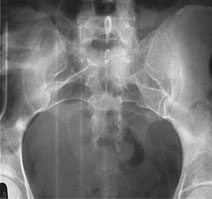X-ray
The diagnostic x-ray division at NewYork-Presbyterian Queens has more than 40 technologists who perform over 70 percent of all the Radiology Department procedures. All staff technologists are registered by the American Registry of Radiologic Technologists (ARRT) and licensed by the New York State Department of Health.
We have 4 state-of-the-art digital x-ray units within the Xray department including the emergency room, as well as a separate orthopaedic unit on the 4th floor. NYP/Queens uses the PACS system which allows physicians access to x-ray images via the Internet for immediate results and diagnosis. The department performs digital general x-ray examinations and digital fluoroscopy procedures.
About Fluoroscopy
Fluoroscopy is an imaging technique commonly used by physicians to obtain real-time moving images of the internal structures of a patient through the use of a fluoroscope. In its simplest form, a fluoroscope consists of an x-ray source and fluorescent screen between which a patient is placed.
Patient Instructions
- Esophagram - The night before the exam, do not eat or drink anything after midnight.
- Upper G.I. Series - The night before the exam, do not eat, drink, smoke or chew gum after midnight. The radiologist also watches the contrast go into and out of the stomach. This test takes approximately 30 minutes.
- Small Bowel Series - The night before the exam dinner should consist of clear liquids only, do not eat, drink, smoke or chew gum after midnight. A timed exam in which the patient is given contrast to drink and x-rays are taken approximately 15 minutes apart to follow the contrast through the small intestine. The small bowel series can take up to four hours.
- Barium Enema - For one full day before exam, have a clear liquid diet (plenty of water, clear fruit juices, clear soup, Jello, tea or coffee without milk). Take a laxative, suppository or drug (not Milk of Magnesia), to cleanse the bowel. On the night before the exam, do not eat or drink anything after midnight. This is an exam of the colon in which a small flexible tube is placed in the rectum and the colon is filled with a contrast as the radiologist watches it go through the colon. The test takes approximately 30-45 minutes.



